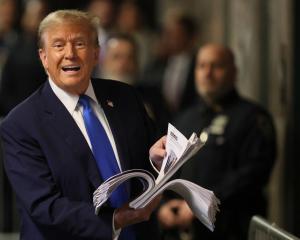Keiko Fujimori, the conservative daughter of jailed former president Alberto Fujimori, led the first round of Peru's presidential election but fell short of outright victory and faces a run-off in June, three exit polls showed.
The close race for second place and a spot in the run-off was between Pedro Pablo Kuczynski, a center-right former World Bank economist, and leftist lawmaker Veronika Mendoza.
Fujimori, a US-educated former congresswoman, needed 50 percent to win power in the first round but exit polls showed her with support at below 40 percent.
She is vulnerable in the run-off because many voters opposed to her father's authoritarian rule in the 1990s are likely to rally behind her rival.
The Ipsos polling firm said an unofficial quick count of ballots showed Fujimori had 39.2 percent support in the first round of voting with Kuczynski on 22.1 percent and Mendoza on 18.4 percent.
But it had not yet counted 15 percent of sample ballots, including from rural areas, where Mendoza and Fujimori have stronger support than Kuczynski.
Exit polls showed Kuczynski and Mendoza were even closer.
Support for Fujimori, 40, slipped after tens of thousands protested against her on April 5, 24 years after her father shut Congress with the support of the army.
A runoff between Fujimori and the 77-year-old Kuczynski would likely ensure Peru's free-market economic model remains intact. Kuczynski is seen as Wall Street's preferred candidate.
Mendoza wants to limit Peru's crucial mining industry - the country is on track to become the world's No. 2 copper producer - and her late surge in opinion polls spooked investors.
Rising crime was a central campaign issue and many Peruvians question why poverty persists with such vast mineral wealth.
Kuczynski, a former finance minister known in Peru as "PPK", danced in front of supporters on Sunday night but urged calm until official results came in.
"We don't want a polarized nation," he said in front of his pink campaign banner.
Mendoza, 35, thanked her supporters from her home city of Cuzco, once the capital of the Incan empire. "We've shown that we can do politics differently," she said.
Partial official results were expected later on Sunday and the country's electoral body said it would finish counting on Monday.
A recent Ipsos poll showed Kuczynski would likely beat Fujimori in a second-round election while Mendoza was seen in a statistical tie with Fujimori.
CONTROVERSIAL RULE
Alberto Fujimori, a right-wing populist, is serving a 25-year prison term for human rights abuses and corruption during his 1990-2000 rule.
He is fondly remembered by some for building rural schools and hospitals and implementing neo-liberal reforms that remain in place. Keiko Fujimori famously became Peru's first lady at 19 when her parents divorced.
She promises to preserve democracy and extend 25 years of free-market policies if she wins power.
The elder Fujimori said his hard-line measures were necessary to defeat the Maoist-inspired Shining Path guerrilla group.
In a reminder of that bloody conflict, rebels presumed to be remnants of the Shining Path on Saturday ambushed soldiers sent to safeguard ballots, leaving at least six dead, authorities said.
At a news conference, Fujimori criticized outgoing President Ollanta Humala, a former leftist military officer who has governed more moderately than expected.
"I'm sorry this government had allowed not only crime to advance in the streets but has also permitted Shining Path to keep taking lives and shedding blood in our country."
Fujimori has pledged to build high-altitude prisons in the Andes to isolate dangerous criminals, and said she would drive economic growth forward by tapping a rainy day fund and issuing new debt to fund badly needed infrastructure.
She says her father is innocent and should be absolved by the courts but has promised not to use her political power to free him from jail or repeat his authoritarian tendencies.
"I voted for Keiko because she's not to blame for what her father did," said 41-year-old Carlos Zevallos. "Crimes aren't inherited."













